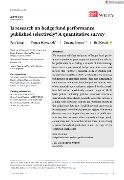Is research on hedge fund performance published selectively? A quantitative survey

Publication date
2024Published in
Journal of Economic SurveysVolume / Issue
38 (4)ISBN / ISSN
ISSN: 0950-0804ISBN / ISSN
eISSN: 1467-6419Metadata
Show full item recordCollections
This publication has a published version with DOI 10.1111/joes.12574
Abstract
We examine whether estimates of hedge fund performance reported in prior empirical research are affected by publication bias. Using a sample of 1019 intercept terms from regressions of hedge fund returns on risk factors (the "alphas") collected from 74 studies published between 2001 and 2021, we show that the selective publication of empirical results does not significantly contaminate inferences about hedge fund returns. Most of our monthly alpha estimates adjusted for the (small) bias fall within a relatively narrow range of 30-40 basis points, indicating positive abnormal returns of hedge funds: Hedge funds generate money for investors. Studies that explicitly control for potential biases in the underlying data (e.g., backfilling and survivorship biases) report lower but still positive alphas. Our results demonstrate that despite the prevalence of publication selection bias in many other research settings, publication may not be selective when there is no strong a priori theoretical prediction about the sign of the estimated coefficients.
Keywords
hedge funds, meta-analysis, publication bias
Permanent link
https://hdl.handle.net/20.500.14178/2198License
Full text of this result is licensed under: Creative Commons Uveďte původ 4.0 International






